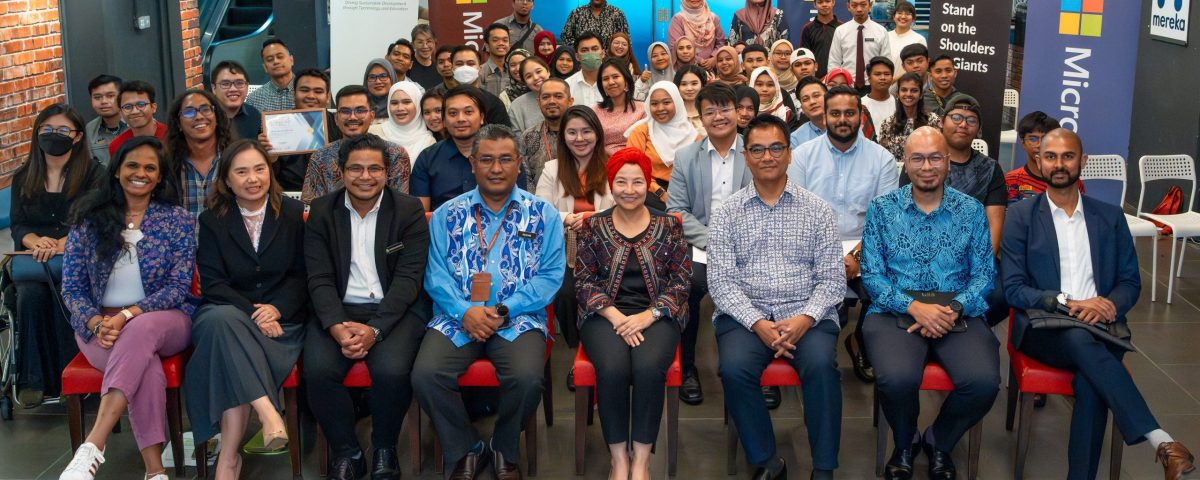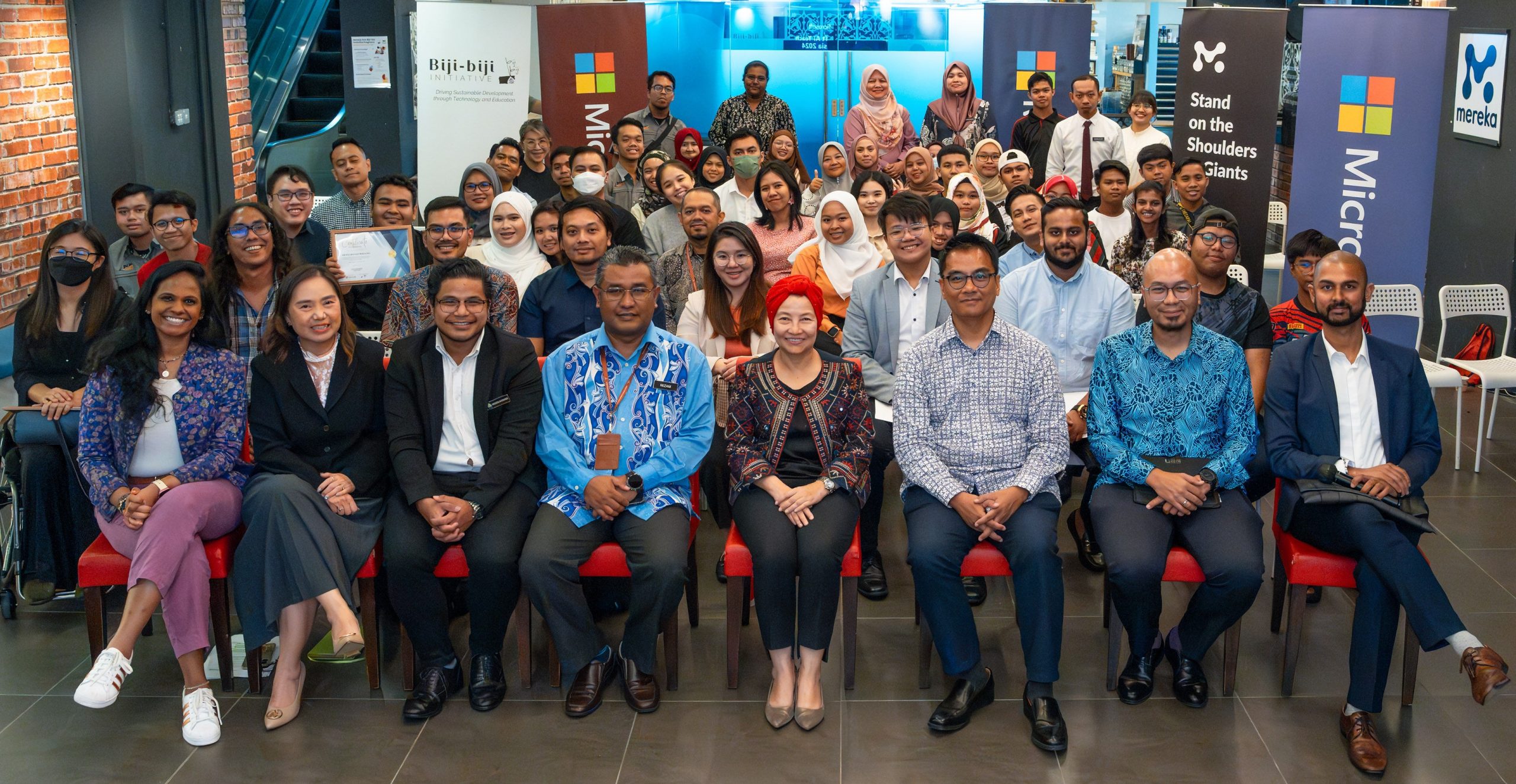
Aston Martin Aramco Formula One® Team and NetApp Renew Partnership
February 5, 2024
Interview: Productivity and talent development will be key to the future of AI
February 14, 2024ASEAN Foundation, Biji-biji Initiative, and Microsoft collaborate to shape an AI-enabled economy for Malaysia through AI TEACH Malaysia Program

(Photo above) From left: Rashvin Pal Singh, Group Chief Executive Officer of Biji-biji Initiative & Mereka; Syed Aswad Syed Izaddin, Head, MSME and Industry Digital Readiness Division of the Malaysian Communications & Multimedia Commission (MCMC); Tuan Haji Muhammad Razali bin Anuar, Chief Industry Development Sector of MCMC; Azizah Ali, Chief Operating Officer, Microsoft Malaysia; Muhammad Nizam bin Ahmad, National TVET Council (MTVET) Secretariat; Andreas Charles Akobiarek, Head of Recruitment Unit of Employment Services Department, MYFutureJobs; and Supahrat Juramongkol, Microsoft Philanthropies Lead for ASEAN all thumbs up at the AI TEACH Malaysia launch event in Kuala Lumpur
KUALA LUMPUR, 8 February 2024 – The rise of Artificial Intelligence (AI) across ASEAN has become a defining force and is poised to contribute an estimated USD 1 trillion to the region’s GDP by 2030.[1] As the digital landscape evolves, the imperative to prepare the workforce for the challenges and opportunities in this new era of AI has never been more paramount.
Recognizing the crucial role of skilling to empower the workforce to supercharge their careers and foster inclusive economic growth, the ASEAN Foundation and Microsoft have launched the AI TEACH for ASEAN program aimed at shaping the region’s tech future where AI proficiency is a cornerstone of success.
In collaboration with local nonprofits, workforce institutions, and governments, AI TEACH aims to drive significant employment and education outcomes for individuals seeking to upskill themselves. This concerted effort aims to harness the power of AI and other technologies, ultimately enhancing economic outcomes for the workforce.
The AI TEACH for ASEAN program aims to provide AI literacy training to 6,200 Technology Vocational Education and Training (TVET) educators in ASEAN, with a focus on Indonesia and Malaysia. Using the Microsoft AI Trainer Toolkit, the program will empower educators to effectively teach AI concepts and introduce Microsoft and LinkedIn Career Essentials in Generative AI to students, where those who successfully complete the course will be awarded a globally recognized certification that affirms their AI competencies.
AI TEACH for ASEAN aims to bring positive changes to the TVET system by integrating AI skills to align with evolving industry requirements. This will be achieved through several key initiatives. The first being the training-of-trainers for TVET educators through collaborations with the Senior Officials Meeting on Education and ASEAN Secretariat, which ensures government involvement and support.
In Malaysia, the main objective is to provide AI literacy training to 1,000 TVET educators, empowering them to train 100,000 students locally and help them secure better employment and education opportunities. TVET educators will cascade AI skills training to students via collaborations with local TVET institutions.
Complementing the training-of-trainers, a country-level hackathon will be rolled-out in Indonesia and Malaysia, leading up to a regional hackathon organized in Indonesia, which aims to foster excitement among trainers to integrate their expertise in Generative AI into teaching methods. Finally, a regional TVET policy-roundtable on AI skilling will also be held to invite policymakers, AI experts, and nonprofits to share experiences and best practices.
K Raman, Managing Director for Microsoft Malaysia, shares, “The significance of AI in how organizations and industries operate today cannot be understated. TVET graduates play a critical role in various key sectors in Malaysia, and this is in line with the Malaysian government’s focus on the TVET industry as outlined in the MADANI Budget 2024. Through AI TEACH Malaysia, we’re doing more than just closing the skills gap. We are cultivating TVET educators as well as a new generation of talent, armed with the skills to build a brighter future for societies with AI.”
Together with Microsoft, the ASEAN Foundation will assist in overseeing the implementation of the program. AI TEACH Malaysia will be spearheaded by Biji-biji Initiative with a localized approach to address the unique needs and contexts of the nation.
ASEAN Foundation will focus on delivering the regional policy-roundtable on AI Skilling and organizing a regional hackathon.
Rashvin Pal Singh, Group Chief Executive Officer of Biji-biji Initiative and Mereka, also commented, “It is inspiring to see organizations and communities come together to support one another and encourage opportunities for a brighter future! We are excited to be working closely with the ASEAN Foundation and Microsoft to deliver AI skills to Malaysians and supporting the aspirations of nurturing an inclusive Malaysia.”

The AI TEACH Malaysia program was officially launched at Biji-biji Initiative’s headquarters in Kuala Lumpur. The event was also attended by Tuan Haji Muhammad Razali bin Anuar, Chief Industry Development Sector of the Malaysian Communications & Multimedia Commission (MCMC), Mr. Muhammad Nizam bin Ahmad, National TVET Council (MTVET) Secretariat, Mr. Andreas Charles Akobiarek, Head of Recruitment Unit of Employment Services Department, MYFutureJobs.
[1] Kearney. 2020. Al is integral to Southeast Asia’s future, but it is still in an early stage. Retrieved from: https://www.kearney.com/digital/article/?/a/racing-toward-the-future-artificial-intelligence-in-southeast-asia

